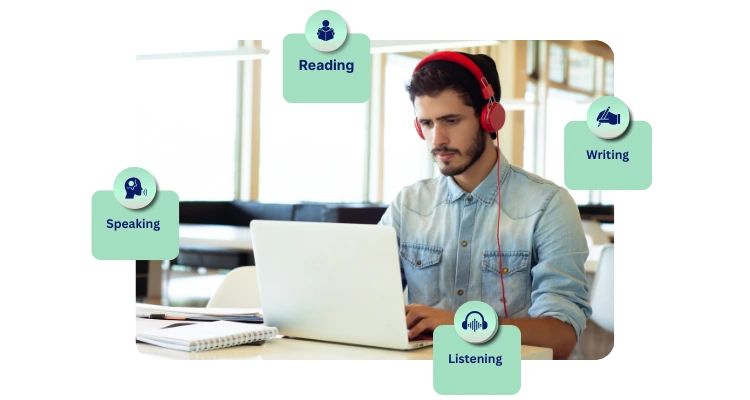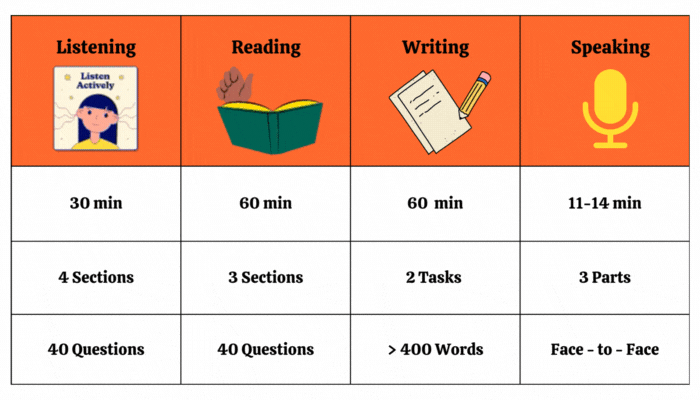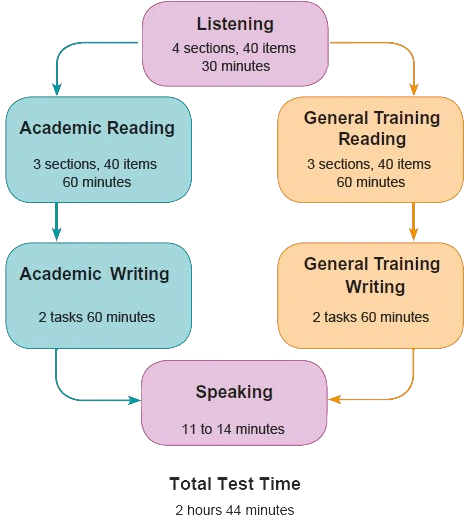

Crack IELTS with Confidence & Global Readiness
IELTS Band Booster Programme
24+ Years . 100% Result-Focused

International English Language Testing System (IELTS)
NIPSTec being a nodal associate of IDP IELTS, specializes in providing IELTS coaching to students from all walks of life. The International English Language Testing System (IELTS) generally has two exams – IELTS Academic and IELTS General Training. You can opt for either one of them depending upon your requirement or the university/ course you will be applying to. Candidates should be well informed that, both versions of the IELTS are instrumental in providing a valid and accurate assessment of candidates listening, reading, writing, and speaking language skills.
IELTS General
IELTS General Training is for aspirants who are looking to migrate to New Zealand, Australia, Canada, the US, and the UK or applying for secondary education, training programs, and work experience in an English-speaking environment. Here the examination focuses on the basic survival skills of a candidate in a broad social and workplace environment.

IELTS Academic
IELTS Academic is for candidates who are interested in applying for higher education or professional registration in countries that use English as their fundamental language of communication. The main purpose of the examination is to judge whether a candidate is ready to begin studying or training in the English language. Countries that widely recognize IELTS for studying are the US, UK, Canada, Australia, and New Zealand.

The following will be benefited:

Students Going Abroad

Professionals / Entrepreneurs

Housewives

Foreigners
Key Learnings - IELTS

IELTS Writing Section
Candidates take an academic writing module. Responses to the academic writing module are short essays or general reports, addressed to an educated non-specialist audience. There are two compulsory tasks. Task 1 requires 150 words, and candidates are asked to look at a diagram, table, or data and to present the information in their own words. Task 2 requires at least 250 words, and all candidates are presented with a point of view, argument, or problem and asked to provide general factual information, present a solution, justify an opinion, evaluate ideas and evidence, etc.

IELTS Reading Section
The Reading Module consists of three texts of general interest dealing with issues that are appropriate for candidates entering postgraduate or undergraduate courses. Both reading modules consist of three passages or sections with forty questions. Question types include multiple-choice, sentence, or summary completion, identifying data for short-answer questions, matching lists or phrases, and identifying writers’ views/attitudes.

IELTS Listening Section
The Listening module is divided into four sections. The first two conversations are concerned with social needs, while the last two are concerned with situations more closely related to education. They will all be around three minutes long. The conversations could be both monologues and dialogues. These conversations can be heard once only. A variety of question types are asked, like multiple-choice, short-answer questions, note completion, sentence completion, labeling a diagram, etc.

IELTS Speaking Section
The Speaking section is like a structured interview with an emphasis on general speaking skills. It assesses whether candidates have the required knowledge and skills to communicate effectively with native speakers of English.
IELTS Exam Pattern
| Section | Description | Questions / Duration |
|---|---|---|
| LISTENING | It encompasses four recorded monologues and conversations. | 4 Sections, 40 Items, Approximately 30 minutes |
| READING | Three long reading passages with tasks. Texts range from descriptive and factual to discursive and analytical. Includes non-verbal material like diagrams, graphs, and illustrations. Texts are authentic (taken from books, journals, and newspapers). | 3 Sections, 40 Items, 60 minutes |
| WRITING | A writing task of at least 150 words where the candidate must summarize, describe, or explain a table, graph, chart, or diagram, and another short essay task of at least 250 words. | 2 Tasks, 60 minutes |
| SPEAKING | The face-to-face interview includes short questions, speaking at length about a familiar topic, and a structured discussion. | 3 Tasks, 11 to 14 minutes |
Frequently Asked Questions (FAQ)
How do I register for the IELTS?
You can register online through the official IELTS website or visit the nearest IDP or British Council office. NIPSTec also assists students with the registration process.
After I have registered, may I change my registration to a different date or test center?
Yes, changes can be made, but only if requested at least 5 weeks before the test date. Rescheduling fees may apply.
Under what circumstances will my registration be canceled or changed without my consent?
In rare cases like test center closure, natural disasters, or technical issues, your test may be rescheduled by the test authorities.
How is the IELTS graded?
IELTS is graded on a 9-band scale for each of the four skills: Listening, Reading, Writing, and Speaking. Your overall band score is the average of these four scores.
What types of scores will I receive after taking the IELTS?
You will receive an overall band score and individual scores for each section: Listening, Reading, Writing, and Speaking.
What is considered a 'good' score on the IELTS?
A score of 6.5 to 7.5 is generally considered good and is accepted by most universities and immigration authorities.
Do all universities in English-speaking countries accept the IELTS?
Most universities in countries like the UK, Australia, Canada, and New Zealand accept IELTS. Some U.S. universities also do.
What are some of the other purposes for which the IELTS is accepted?
Besides education, IELTS is accepted for immigration, work permits, and professional licensing in many countries.
Is the PBT (Paper-Based Test) easier than the iBT (Internet-Based Test)?
No. The difficulty level is the same for both formats. The choice depends on your comfort with computer-based tests.
Are there still preparation materials available for the PBT?
Yes, NIPSTec provides preparation materials for both PBT and CBT formats.
How much longer will the PBT continue to exist?
While many centers are moving toward computer-based testing, the paper-based format is still available in select locations for now.
IELTS vs TOEFL vs PTE : Key Differences
| Basic | IELTS | TOEFL | PTE |
|---|---|---|---|
| Ease | Easier | Easy | Easiest |
| Medium | Paper and Computer | Computer | Computer |
| Assessed by | Human or Computer | Human AND Computer | Computer |
| Sections | Four | Four | Four |
| Scores | 0-9 Bands | 0-120 | 10-90 in decimals |
| Good Score | 6.5+ | 100/120+ | 75/90+ |
| Ideal for | UK, USA, Canada, etc. | USA | Australia, UK, Canada |
| English System Used | British or American | British and American | British and American |
| Question Types | MCQs, essay writing, true/false | Sentence formation, essay writing | 20 different types, including MCQs |
| Duration | 2h 45m | 2h | 2h |
| Result Time | 3–5 days (CBT) | 4–8 days | 1–5 days |
| Attempts | Unlimited | Once every 3 days | No limit (up to 5x/month) |
| Accepted by | Most countries | More preferred in USA | Limited (70 countries) |
